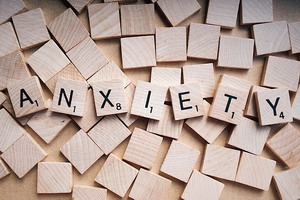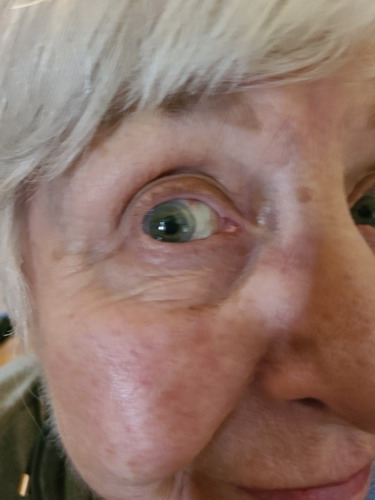 During our weekly family Zoom last week, my sister asked me if I would do a newsletter on anxiety. This seems to be a very common condition. It is a little different from outright fear, as fear is a response to an actual threat here and now while anxiety is more of a dread of future occurrences. Typically it is a
feeling that something bad is going to happen or may happen for some reason. Most everyone has these feelings at one time or another. It is a normal response to situations that are new to you or involve anticipated experiences that have been uncomfortable in the past. So it is normal to feel anxious about your upcoming driving test or dinner at your boss's house.
During our weekly family Zoom last week, my sister asked me if I would do a newsletter on anxiety. This seems to be a very common condition. It is a little different from outright fear, as fear is a response to an actual threat here and now while anxiety is more of a dread of future occurrences. Typically it is a
feeling that something bad is going to happen or may happen for some reason. Most everyone has these feelings at one time or another. It is a normal response to situations that are new to you or involve anticipated experiences that have been uncomfortable in the past. So it is normal to feel anxious about your upcoming driving test or dinner at your boss's house.
 Normal anxiousness is the feeling you get when your body ramps up its awareness levels to get you focused so you can respond clearly and quickly. This is a stress response and levels of the stress hormone cortisol jump up in your bloodstream. Adrenaline also starts pumping to prime your muscles and nervous system for
immediate action if needed. A big chunk of that anxious feeling is simply the chemical effects of the excess adrenaline and cortisol rushing around in you. Folks that have adrenal tumors causing this excess hormone production feel this anxiousness all the time as a result.
Normal anxiousness is the feeling you get when your body ramps up its awareness levels to get you focused so you can respond clearly and quickly. This is a stress response and levels of the stress hormone cortisol jump up in your bloodstream. Adrenaline also starts pumping to prime your muscles and nervous system for
immediate action if needed. A big chunk of that anxious feeling is simply the chemical effects of the excess adrenaline and cortisol rushing around in you. Folks that have adrenal tumors causing this excess hormone production feel this anxiousness all the time as a result.
 Some anxiousness is normal, but when it is there way too much then it becomes a problem. As such the anxious feeling is a major component of many other psychological disorders. What triggers or is associated with anxiety is what gives rise to the names of these disorders, such as:
Some anxiousness is normal, but when it is there way too much then it becomes a problem. As such the anxious feeling is a major component of many other psychological disorders. What triggers or is associated with anxiety is what gives rise to the names of these disorders, such as:
Panic disorder
Obsessive-compulsive disorder
Phobias
Social anxiety disorder
Separation anxiety disorder
Illness anxiety (hypochondria)
Depressive disorders
Post Traumatic Stress Disorder (PTSD)
Chronic pain/inflammation disorders
Substance use disorders
Acute or chronic disease anxiety disorders
 This is probably the shortlist for anxiety disorders, but I see a common thread to all of these disorders — a fear of loss of control. There is an inner conviction that something is going on and you have no control over that something. Sometimes the disorder is an ineffective attempt to establish control over
either the something or the feelings of anxiety. Panic is your body telling you to drop everything and run. Obsessive/compulsive behaviors are rituals for gaining a feeling of control. Phobias are your early warning system telling you to avoid something you have no control over. Each of these involves behaviors or mechanisms for trying to control that bad feeling in some way, either from the inside out or by altering your environment.
This is probably the shortlist for anxiety disorders, but I see a common thread to all of these disorders — a fear of loss of control. There is an inner conviction that something is going on and you have no control over that something. Sometimes the disorder is an ineffective attempt to establish control over
either the something or the feelings of anxiety. Panic is your body telling you to drop everything and run. Obsessive/compulsive behaviors are rituals for gaining a feeling of control. Phobias are your early warning system telling you to avoid something you have no control over. Each of these involves behaviors or mechanisms for trying to control that bad feeling in some way, either from the inside out or by altering your environment.
 Modern medicine says that they don't know what causes anxiety. To put that into normal people's language, what they mean is that they have not found a chemical switch they can flip off with an expensive drug to turn off anxiety. I find this medical language a lot in articles I read. “We don't
know” often means “We don't know how to profit from," and “causes” means “medically controllable causes." So they are just as concerned with control as we are.
Modern medicine says that they don't know what causes anxiety. To put that into normal people's language, what they mean is that they have not found a chemical switch they can flip off with an expensive drug to turn off anxiety. I find this medical language a lot in articles I read. “We don't
know” often means “We don't know how to profit from," and “causes” means “medically controllable causes." So they are just as concerned with control as we are.
 The key point for most of us is that anxiety does not feel good. We don't like it. But there is another big group of people who experience their anxiety as symptoms in their body rather than feelings of dread or anticipated fear. Common physical manifestations of anxiety include:
The key point for most of us is that anxiety does not feel good. We don't like it. But there is another big group of people who experience their anxiety as symptoms in their body rather than feelings of dread or anticipated fear. Common physical manifestations of anxiety include:
dizziness
tiredness
shaking
dry mouth
heart palpitations
muscle aches and tension
excessive sweating
stomachache
headaches
insomnia
 Neurologically these types of symptoms all have to do with excess firing of the sympathetic fight or flight nerves. The counterpoint to this nervous system is the parasympathetic nervous system, predominately carried in the vagus nerve from the head to the organs of the body. Calming down these types of reactions
comes down to stimulating the vagus nerve while calming the sympathetic nerves that run up and down along your spine. Calming the sympathetic nerves has always been one of the major reasons folks go to a chiropractor. Stimulating the vagus nerve can be done in many ways. Anything that stimulates the back of the throat activates this nerve, so chanting, singing, swallowing, and humming are all good. Belly breathing and meditating are good. Electrical stimulation of the nerve directly can be done
in the neck and with special ear clips. Medicine is even wrapping electrodes around the nerve surgically and connecting them to a pacemaker-like device in the chest. I have taught many of you a technique using a tiny straw to suck water through that stimulates the swallowing nerves.
Neurologically these types of symptoms all have to do with excess firing of the sympathetic fight or flight nerves. The counterpoint to this nervous system is the parasympathetic nervous system, predominately carried in the vagus nerve from the head to the organs of the body. Calming down these types of reactions
comes down to stimulating the vagus nerve while calming the sympathetic nerves that run up and down along your spine. Calming the sympathetic nerves has always been one of the major reasons folks go to a chiropractor. Stimulating the vagus nerve can be done in many ways. Anything that stimulates the back of the throat activates this nerve, so chanting, singing, swallowing, and humming are all good. Belly breathing and meditating are good. Electrical stimulation of the nerve directly can be done
in the neck and with special ear clips. Medicine is even wrapping electrodes around the nerve surgically and connecting them to a pacemaker-like device in the chest. I have taught many of you a technique using a tiny straw to suck water through that stimulates the swallowing nerves.
 Let's talk for a moment about what I believe is the root cause of anxiety — our fear of the unknown in the future. That future might be 5 minutes from now or years in the future. Often it is simply the fear that you just don't know what to do. When you do not know what to do with things in the past and
you are concerned those things will come up again, you live in constant anxiety over them returning. Frequently those failures to handle life happen at very young ages and you don't even remember just what those things are anymore, but your body does and it reacts. I see this one a lot in patients. Their body will have symptoms for seemingly no reason, but the reason is there in an emotional reaction playing out in the body. All they know is that they have been stressed
lately.
Let's talk for a moment about what I believe is the root cause of anxiety — our fear of the unknown in the future. That future might be 5 minutes from now or years in the future. Often it is simply the fear that you just don't know what to do. When you do not know what to do with things in the past and
you are concerned those things will come up again, you live in constant anxiety over them returning. Frequently those failures to handle life happen at very young ages and you don't even remember just what those things are anymore, but your body does and it reacts. I see this one a lot in patients. Their body will have symptoms for seemingly no reason, but the reason is there in an emotional reaction playing out in the body. All they know is that they have been stressed
lately.
 I believe that when we are young we are not able to permit ourselves to not know what to do. We fear that if we don't do things right then we won't be loved and won't be taken care of. We judge ourselves as bad or wrong in some way when our immature response to life does not work out well. This is coupled
with the unfortunate lie we all have that everything around us is all about us. Our perspective is limited by our lack of experience and lack of brain development. That development eventually allows us to look at life from other's perspectives. Before age 7 we can not do that on a feeling level. The wiring just is not there. Consequently, we believe that somehow we are the cause of everything because everything is all about us. That is a huge burden.
I believe that when we are young we are not able to permit ourselves to not know what to do. We fear that if we don't do things right then we won't be loved and won't be taken care of. We judge ourselves as bad or wrong in some way when our immature response to life does not work out well. This is coupled
with the unfortunate lie we all have that everything around us is all about us. Our perspective is limited by our lack of experience and lack of brain development. That development eventually allows us to look at life from other's perspectives. Before age 7 we can not do that on a feeling level. The wiring just is not there. Consequently, we believe that somehow we are the cause of everything because everything is all about us. That is a huge burden.
 We are designed to be curious about life. We are designed to play with life and to learn things through trial and error. Error is okay, even necessary. We need healthy parenting that supports our learning through making mistakes. We need to know that mistakes are no big deal. We can adapt and try something else next
time to produce a better outcome. We don't need to be afraid and inhibit our curiosity, nor do we need to demand life be our way. In other words, we don't have to learn through the experience of hard knocks. It is okay if we get frustrated. It is okay if we fail. The encouragement to keep trying until we figure it out on our own is vital to developing a mentally healthy child. Unfortunately, most of us did not have such parents. Anxiety is the result.
We are designed to be curious about life. We are designed to play with life and to learn things through trial and error. Error is okay, even necessary. We need healthy parenting that supports our learning through making mistakes. We need to know that mistakes are no big deal. We can adapt and try something else next
time to produce a better outcome. We don't need to be afraid and inhibit our curiosity, nor do we need to demand life be our way. In other words, we don't have to learn through the experience of hard knocks. It is okay if we get frustrated. It is okay if we fail. The encouragement to keep trying until we figure it out on our own is vital to developing a mentally healthy child. Unfortunately, most of us did not have such parents. Anxiety is the result.
 Well, we can parent ourselves now. We can give ourselves permission to not know what to do and have that be okay. We can figure it out if we allow ourselves to fumble and try again.
Well, we can parent ourselves now. We can give ourselves permission to not know what to do and have that be okay. We can figure it out if we allow ourselves to fumble and try again.
Take care,
David
Ellen
Yesterday Ellen went in for an eye exam. I was jealous as her eyes had not changed at all over the last year and a half. They also did a wide angle photo of the back of her eye, the retina. Her last such photo was back in 2018 and the new one looked exactly the same! Good job Ellen!

